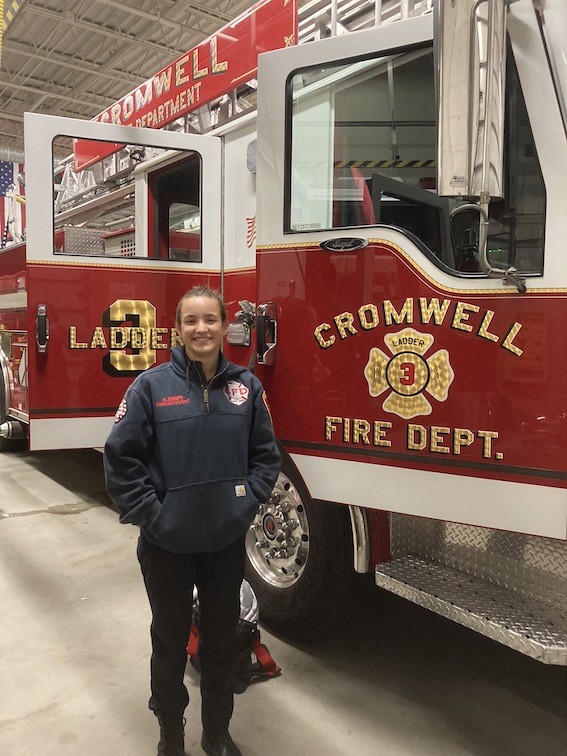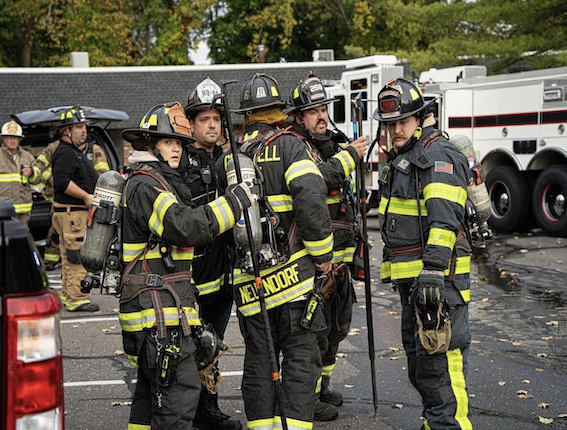
c/o Thomas Lyons
On Sunday, Sept. 29, Ayden Crispe ’26 woke up at 4 a.m., lifted weights, showered, waved goodnight to the returning partiers, and drove to a 24-hour shift at the Cromwell Fire Department.
Crispe is Cromwell’s youngest firefighter and the station’s first full-time female crew member. She lives at the station on-call 48 hours a week.
“24 hours on, 72 hours off,” Crispe said.
Crispe, who didn’t count on sleeping much that night, whose dark humor keeps coworkers laughing, and whose white firefighting gloves have been blackened by smoke, has been balancing life as a full-time student and full-time firefighter since June 2024.
“All my classes are on Tuesday and Thursday, so that works out pretty well,” Crispe said. “And I’m in two a capella groups [Cardinal Sinners and Onomatopoeia].”
Crispe walked over to the ladder truck she’d be riding that night and readied her self-contained breathing apparatus (SCBA), checking the flow of oxygen. The device, a 25-pound backpack-looking cylinder of oxygen, began to beep.
“It alarms when you don’t move for 20 seconds, and the longer you stay still the louder it gets.” Crispe said. “Because in a fire, if somebody stops moving, they’re probably dead.”
Crispe picked up her helmet next to her SCBA and laughed about the stickers.
“It’s a monkey with a Monster [energy drink] and ZYN,” she said. “It’s funny because I don’t do either of these.”
Below the intoxicated primate is a “B-Shift” sticker, the name of Crispe’s seven-person crew.
“The guys here, they’re my family,” Crispe said, pointing to the station’s kitchen. “I have a lot of father figures here. They want me to succeed. And when they’re hard on you, you know, it’s a good thing—that means they care.”
For the firefighters, the toll stays with them long after shifts.
“There have been many really intense calls I’ve been on, that, I’m like, ‘Wow, this is exactly why I’m here,’” Crispe said. “And there were also times where I’m like, “Oh my god, this is so much. I’m so tired.’ It’s hard sometimes when I get to school, and I’m exhausted because I didn’t sleep. But obviously the crew is all really here for each other. We really try to make each other laugh as much as possible.”
Greg Bannon, a Cromwell Firefighter for two years following a 23-year career at the Hamden Department, celebrated Crispe as part of a wave of younger firefighters. When he first started at Cromwell, the Department only had three firefighters for shifts. Now, they’re up to seven with funding for nine.
“It’s been great having the young firefighters come in,” Bannon said. “Some of them come in quite green.”
Five Years on the Force
When Crispe was 15 years old, she drove by a sign soliciting volunteers outside of her local fire station in Pawlet, Vt.
“I had never thought about doing firefighting before,” she said. “And then I saw that, and I was like, ‘Okay, like, I’m gonna go tomorrow.’ And so I showed up in my little bunny socks and skirt, and they were like, ‘Yeah, become a junior member here.’ And then I just fell in love with it.”
After junior training in Vermont, Crispe did ride-alongs at Niskayuna Fire Department in N.Y., near where she used to attend, Union College.
“I did not like [Union] very much, so I spent most of my time at the fire department and got my EMT [certification] as soon as I turned 18,” Crispe said.
After her transfer to Wesleyan in Fall 2023, Crispe did ride-alongs at the Cromwell station last year before getting hired for a full-time position in June. According to Crispe, The Middletown Fire Department requires recruits to go through their own Fire Academy, which wouldn’t be feasible as a full-time student.
“Getting hired at 19 is a big deal,” Crispe said. “I was like, ‘Yeah, cool. I’ll do it. I’m always going to regret it if I don’t.’”
Once they’ve completed two years of candidate training, the department ranks recruits on three categories: the Candidate Physical Ability Test (CPAT), a holistic interview, and a written exam. The CPAT, Crispe described, has the same standards for men and women and begins with three minutes on the stairmaster wearing an 80-pound vest.
“When I took my test here, I’m sure a lot of guys were like, ‘Oh, you know, this young girl, whatever,’ and then, I ended up [ranked] first on the list,” she said.
Crispe estimates her recruitment class had over 40 people.
“Being a woman in the fire service, you have to just not let people bother you,” Crispe said. “People are going to always expect you to not have what it takes. And you just have to try harder. I show up, and I train, and I do what I need to do. You just have to persevere.”
Though the Cromwell Department has two part-time female firefighters, Crispe is the first ever full-time woman on staff.
“I had never thought, ‘Oh, I could be a career firefighter and go to school,’” Crispe said. “But I make it work. And I’m so happy I did.”
Academically, Crispe emphasized how her work as a firefighter has expanded and deepened her education.
“I have so many interests, and think education is a priority always,” Crispe wrote in an email to The Argus. “Film and media studies is something I wanted to pursue along with neuroscience as I’m fascinated by how media impacts behavior, specifically violence. I do intend to make a senior thesis documentary about the fire service and how it compares to a liberal arts school like Wesleyan and what I’ve learned from people in both places specifically about morals and politics.”
The Weight of the Job

c/o Ayden Crispe
Opening up the side compartment on the station’s squad truck, Crispe pointed to the Holmatro Spreader tool, designed to open up damaged cars in large crashes.
“Lots of fun stuff,” she said, noting the Paratech Struts designed to stabilize vehicles, and the air bags strong enough to lift semi-trailer trucks.
Because the I-91 Highway runs through the fire district, Crispe explained, the Department responds to a lot of car crashes.
“When the [dispatch] alarm goes off, we get this terrible noise,” Crispe said. “If it’s a fire call, you get a ‘dedodedodedodedo’ [pre-alert tone]. If it’s a medical call, ‘do do do do.’ And structure fires are a long note.”
The most common cause of fires are kitchen appliances, lithium ion batteries, and dryers catching on fire, according to Crispe. Words for the University audience: clean out your lint trap.
Crispe estimated that the station responds to between 6 to 20 calls over a 24-hour shift. She guessed, conservatively, that she has personally responded to over 1,000 cumulative calls thus far.
“But obviously dispatch [the call center translating the calls to the fire department] isn’t there, so they can’t see what’s happening in real life,” Crispe said. “Sometimes things are completely wrong. You’ll get to an Alpha call [least intense ranking] and the person is not alive. You know? You’ll have weird situations like that.”
Crispe discussed the ways that being a firefighter impacts her life on a more personal level.
“The fire department is a weird place because you definitely get—not, like, desensitized—” Crispe trailed off. “But if you’re super emotional about it, you can’t get through your day. We all try to make each other laugh as much as possible.”
She mentioned the difficulties that come with the transition between being a student and firefighter.
“It’s part of the job, and that’s something that I have a hard time with when coming back to school, because it’s a really weird shift,” Crispe said. “Sometimes I’ll get back from a really bad call, and then I’m on campus, and I’m back in class, and I have no time to process what has happened. I can’t really think about it, or else I won’t be able to get through my day.”
Crispe recounted one of her first nights on shift at Cromwell.
“Last year, we had a call where a man got hit by a car at 60 miles an hour,” Crispe said. “I remember getting there and cops telling me to grab suction to get blood out of the guy’s mouth. And time slowed down for me. It’s kind of all a blur. It was intense, but it’s okay…. You have those kinds of calls.”
Daily Life at the Station
Crispe walked to the station’s kitchen, where a group had gathered to watch “South Park.”
“They don’t love the media,” Crispe warned me.
Bannon—whom Crispe referred to as a father figure—estimated that the Cromwell Department receives over 3,000 calls a year, a volume that increases every calendar year.
“We have an aging elderly population that demands more services,” Bannon said. “And people just demand us to be able to do more and more things, and we provide services for almost everything.”
Their services include everything from turning off water pressure to delivering babies.
“But it gets much harder to put the gear on the older you get,” Bannon said. “In four years, I’ll be almost 60. It’s a young man’s game.”
Almost four decades span Crispe and Bannon. But tonight they’ll share the dispatch calls, and the steak dinner, and whatever episode of “South Park” is on cable.
“Ayden will work under somebody with a little bit more experience on calls,” he said. “And then, someday, she’ll be the senior firefighter showing the rules to the new guy, or woman.”
Thomas Lyons can be reached at trlyons@wesleyan.edu.


